The Rancilio Silvia V6 is the sixth generation of Rancilio’s single-boiler espresso machine. This $900 hunk of stainless steel is designed to provide espresso enthusiasts with a solid platform to pull barista-level shots and make coffee-shop-quality milk drinks in their own kitchen. And to look good doing it.
While it’s very pricey in the U.S., the Silvia V6 offers premium looks and construction, and is built to stand the test of time. Its steam wand is excellent, and it produces beautiful espresso, although you’ll need to know what you’re doing.
And there’s the catch. The Silvia has no PID temperature controller, meaning you must either modify it with one or follow a fiddly and long-winded ‘temperature surfing’ process to achieve consistent results. This is fine for those with the know-how or who like a challenge, but it makes the Silvia unsuitable for newcomers to espresso, or anyone wanting great espresso quickly and easily.
So, is this one of the best espresso machines for you? Find out in my full Rancilio Silvia review.
Rancilio Silvia review: Price & availability
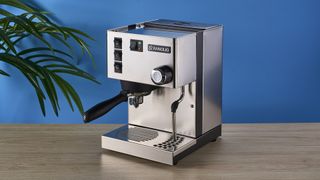
The Rancilio Silvia is currently in its sixth iteration and is available in black, stainless steel or white. In the U.S. it costs $900 at Amazon as the machines have to be shipped across the Atlantic from Europe, while in the U.K. you can expect to pay around £550. It’s a pricey machine, especially compared to the Gaggia Classic ($550), Breville Duo Temp Pro ($499) and Breville Bambino Plus ($299).
Rancilio Silvia review: Design
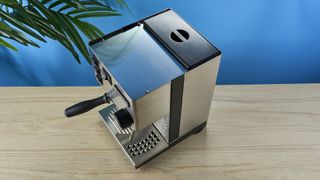
The Rancilio Silvia is a beautifully styled machine. The retro, commercial-esque design hasn’t changed at all over the years, but is timeless and stylish with its steel case and matte black group head.
The Silvia’s construction is just as epic. It’s put together extremely well using premium materials, and is built to last. Browse some coffee forums or Reddit and you’ll see stories of people running these machines for a decade. It’s also a compact machine thanks to the single-boiler design, meaning it’ll fit nicely onto most worktops, although the Gaggia Classic ($499) is narrower and better for super tight spaces.
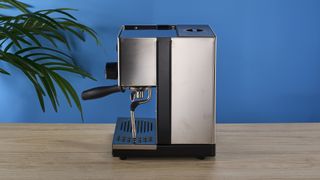
The Rancilio Silvia comes with a beautiful 58mm tamp and uses commercial 58mm portafilter baskets instead of the smaller 54mm baskets found on Breville machines. Each size has its advantages and disadvantages when it comes to espresso flavor, although you’ll get great results from both (besides, results will likely be driven more by other factors including your grinder and temperature surfing). I prefer the 58mm size because of the broader choice of aftermarket commercial accessories.
Rancilio Silvia review: Espresso
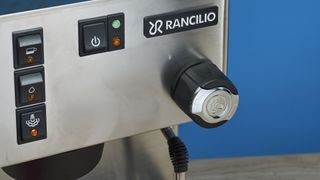
When the circumstances are right, the Rancilio Silvia produces lovely espresso. Now, the caveat at the start of that sentence is important, because this machine is a very fiddly thing to get working consistently. The Silvia is a single boiler design and has no PID controller, which is a device that controls temperature to keep it stable. Without stable and consistent boiler temperatures, you won’t get consistent shots. Such is the case with the Silvia.
I noticed immediately that some of my shots were coming out great, while others were struggling to pull or coming out with different consistencies and flavor profiles. I used the same beans and grind (using our Eureka Mignon Specialita test grinder), with the same dose of 18g. I was looking for a shot of 36g, so a standard ratio of 1:2 coffee-in to liquid-out.
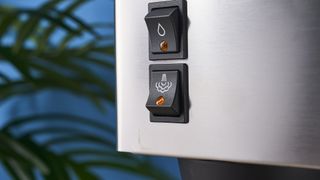
To get round this, the best thing to do is modify the Silvia by fitting an aftermarket PID, which is a very common modification to make and will cost you around $100. Alternatively, you’ll need to ‘temperature surf’, which means following a complex process of warming up, pressing buttons, opening the valve, heating the portafilter, yada yada — essentially, riding out the machine’s heating cycles until optimal shot-pulling temperature is reached. There are various different ways to do this, regularly listed and debated online. It’s very fiddly, and takes around 30-45 minutes (although some online guides advise up to an hour).
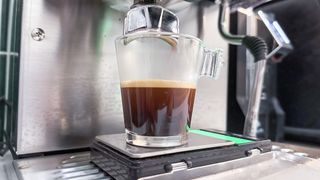
However, once you get the hang of it the machine produces lovely, evenly extracted espresso with rounded flavor profiles and thick crema. I was actually a little taken aback at how nice espresso shots tasted — I usually prefer milk drinks but was more than happy to drink the Silvia’s espresso undiluted. I’ll also admit that even when veering away from the exact surfing steps slightly, I’ve still achieved pleasant if inconsistent results, so you don’t have to temperature surf.
I’m only talking about single drinks here, mind. Making a second would require further fiddling, so if you want a machine for making back-to-back drinks or to use quickly during your morning rush, the Silvia ain’t it.
Rancilio Silvia review: Milk
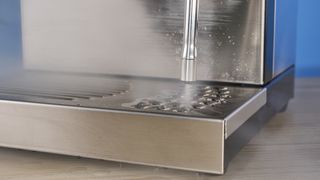
The Rancilio Silvia’s milk wand is excellent, and much more powerful than other machines I’ve tested, including the Breville Duo Temp Pro and KitchenAid Semi Automatic. It feels like the wands on commercial machines I’ve used. I tested the Silvia’s milk wand by making a cortado, several flat whites, a cappuccino and a latte.
Texturing milk for an 8-ounce flat white takes a few seconds, while steaming a large jug of milk for cappuccinos and lattes takes only a few seconds more. Despite its power, the wand is extremely forgiving thanks to its long-throw valve handle which allows you to limit the steam when starting out, or when making small drinks like cortados. It really is a pleasure to use. Below is an image of a flat white made using the Silvia: the milk was velvety, smooth and delicious.

Of course, all of the above is predicated once again upon waiting for the machine to heat up enough to steam, which takes between 5 and 10 minutes. When you don’t get the temperature right, the wand just chucks a load of hot water into your milk.
The Silvia is a single-boiler design, so you can’t steam milk at the same time as you pull espresso. You’ll have to choose which to do first, which is standard with single boiler and thermoblock home espresso machines. This will form part of your temperature surfing process anyway.
Rancilio Silvia review: Storage & maintenance
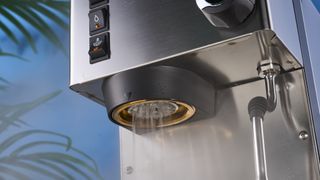
As I mentioned earlier, the Rancilio is relatively easy to “store” on your worktop thanks to its compact single-boiler design. I don’t have much worktop space in my kitchen, but the Silvia slotted in precisely where the Breville Duo Temp Pro was sat before.
The Silvia is easy to keep clean and requires the same upkeep as any other espresso machine. It doesn’t come with a water filter, so monthly descaling is of paramount importance — increase the frequency based on water hardness. You’ll also want to backflush the group head using the rubber flush puck provided.
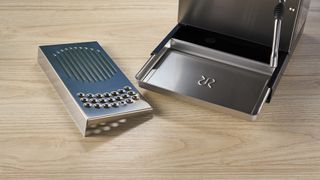
Day-to-day cleaning is par for the course, too. The steam wand requires purging and wiping after use, and you’ll want to rinse the group head after shots by pouring a shot through the empty portafilter, scrubbing the group regularly too. The portafilter basket is quite stiff and requires a palette knife to remove and rinse after each use.
I really like the Silvia’s sturdy metal drip tray. The machine isn’t self purging so there’s no fiddly plastic bits in the tray that get brittle and break over time, as with Breville machines. Make sure you empty it regularly though before it fills: there’s a metal lip on the machine’s frame that you must tilt the tray over, causing spills when full.
Rancilio Silvia review: How does it compare?
The Rancilio Silvia’s natural rival is the single boiler, non-PID Gaggia Classic, which also has unstable temperatures and requires fiddly temperature surfing (unless modified). The Gaggia is cheaper in the U.S. at around $500, and will produce similarly good espresso, but its steam wand is weaker. The Gaggia also uses the versatile commercial 58mm portafilter basket.
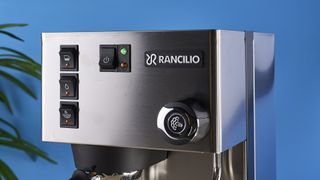
Alternatively, there are thermoblock machines, which heat water by passing it through channels on route to delivery, instead of using a boiler. These heat up much faster, but have weaker steam wands and can suffer unstable temperatures. The thermoblock Breville Duo Temp Pro ($499) and Breville Bambino Plus ($299) feature PIDs for stable temperatures, but weak steam wands. You’ll still get a great milk drink in under 5 minutes, though, versus up to an hour when temperature surfing a single boiler.
The ultimate home espresso machines feature dual boilers and PIDs, like the Rancilio Silvia Pro X ($1,990), allowing you to pour and steam at the same time with consistent temperatures. These cost a lot more money, though, making them an unfair comparison.
Rancilio Silvia review: Verdict
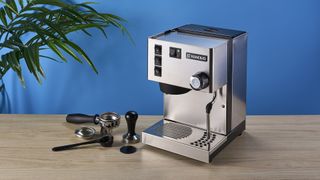
The Rancilio SIlvia is a great espresso machine, but its learning curve is steep and using it is a fiddly process. It is therefore not ideally suited to beginners, who may struggle to get decent and or consistent results without putting in some serious time and thought. Nor is the Silvia suitable for espresso connoisseurs who value their time — to get great results consistently, you’re going to need to devote 30 minutes to an hour each time. If you’re in a rush in the mornings, or you simply lack the patience of a saint, it won’t be for you. For each of these groups, I’d recommend a thermoblock machine like the Breville Duo Temp Pro or Breville Barista Express.
If you work from home or aren’t rushing to make your espresso, though, and you’re an enthusiast that wants to brew fantastic espresso with lots of control, the Rancilio Silvia could be well worth it. With some effort, it’ll brew beautiful espresso, while its steam wand makes milk drinks a breeze. You’ll need to pay a premium in the U.S., where the Gaggia Classic may better suit those on a budget. If you do opt for the Silvia, though, it’ll give you great results for many years to come. I just hope you like surfing.





















 English (US) ·
English (US) ·